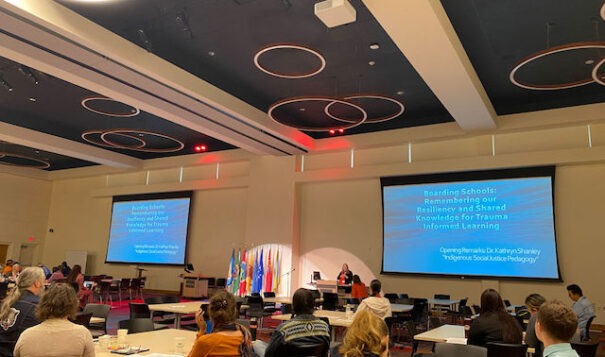News Based on facts, either observed and verified directly by the reporter, or reported and verified from knowledgeable sources.
Boarding school symposium teaches educators trauma-informed practices
 Kathryn Shanley speaks at the beginning of the Boarding Schools Symposium held at the University of Montana on Sept. 30, 2022 (Photo by Kolby KickingWoman, ICT)
Kathryn Shanley speaks at the beginning of the Boarding Schools Symposium held at the University of Montana on Sept. 30, 2022 (Photo by Kolby KickingWoman, ICT)
Orange shirts dotted the auditorium and hallways of the Phyllis J. Washington College of Education at the University of Montana last Friday for an all-day boarding schools symposium.
The symposium was designed to inform educators on the history of Indian boarding schools and the trauma that some practices within have dealt to many families. Organizers hope the event helps educators integrate learning methods that include trauma-informed practices. Doing so would help teachers and programs meet the state-mandated Indian Education For All.
In 1999, the Montana legislature passed the Indian Education for All Act which ensures all schools and students learn the history and contributions of tribes in the state. Montana is home to 12 federally recognized tribes.
Sept. 30 was the National Day of Remembrance for Indian Boarding Schools and orange is the color worn to honor victims and survivors. Boarding schools have been in the spotlight after a number of unmarked graves were found on former campuses in Canada in 2021. The discovery lead to a full investigation of boarding schools in the U.S., which was released in May, as well as a formal apology in July from Pope Francis for the Catholic Church’s role in Canada’s boarding school policy.
Brad Hall, Blackfeet, is the outgoing Tribal Outreach Specialist for the university and helped put together the symposium. He said a lot was put into the event and was pleased with how it unfolded.
“A year of planning, a year of fundraising,” Hall said. “A year of bringing amazing people together to share their stories of resilience and highlight the boarding schools not just as an experience of the past but how it impacts us in the present.”
Selena Coburn, Blackfeet descendant, made the trek to Missoula from Great Falls. As a mental health counselor for the Great Falls public school district, she attended the symposium to learn how to bring more Indigenous cultural knowledge and healing to students and staff in the greater community.
“Boarding School trauma is still affecting our students and our parents and caregivers in our community on a regular basis, and so that healing is occurring now and needs to continue to be at the forefront of our practices as we continue growing as a community,” she said.
Also in attendance was Dacia Griego, Little Shell, and after the pandemic essentially halted most in-person functions and events like this symposium; she was happy to be in a setting where people could come together again.
Working as a Native American Education Specialist with Missoula County Public Schools, she said it is important for non-Natives to recognize the impact boarding schools continue to have on Native communities.
“Working with Missoula County Public Schools, a majority of our teachers are non-Indigenous people. A huge amount of our population are non-Indigenous,” Griego said. “So they need to have that understanding when they are working with our Native students and their families to just know where they come from, why certain behaviors might be happening at school or with families that they don’t understand, having that background knowledge to just give them more empathy and understanding.”
While the symposium gave space to better equip educators, it also provided space to celebrate the strength of Indigenous peoples. Deidre Yellowhair, Diné, said history isn’t just about the trauma but also the resilience of Indigenous people.
She said talking about historical trauma can be heavy but it’s important to balance the trauma.
“It’s a testament to our resilience and our strength and our culture that we’re able to gather here on university grounds,” Yellowhair said. “Not just university grounds but really the traditional grounds, the traditional homelands of Indigenous people and that we can speak our language and greet each other as relatives.”
Dateline:
MISSOULA, Mont.
